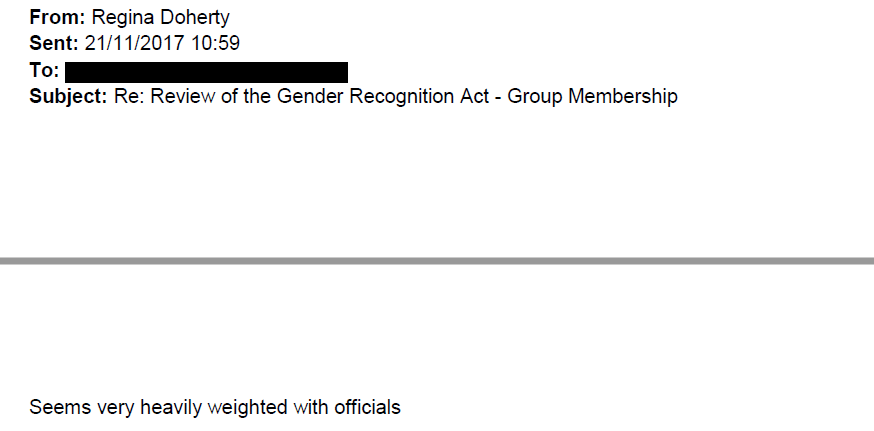Under the radar
"..this was such a small thing in legislation but such an enormous one for the people whose lives we were helping to be better." In fact this legislation is proving to be an enormous one for everyone as activists demand further embedding of gender ideology into law and society.



Senator Regina Doherty was the Minister for Employment and Social Protection when the Gender Recognition Act Review Group was set up in 2017. There were no less than four lobbyists on it, including the chairperson Moninne Griffith, then the Executive Director of BeLonG To. There was no committee member to represent the interests of women, and no submission from the National Women's Council of Ireland (NWCI).
Despite this in November 2017 then Minister Doherty commented in an email regarding the review group composition:

"somehow slipped in under the radar"
One of the lobbyists represented on the GRA Review Group was Sara Phillips, then chair of TENI, the Transgender Equality Network Ireland. Another member of TENI is board member Aoife Martin: https://www.gendergp.com/ireland-trans-rights-aoife-martin/
What’s less well known, and seemed to have somehow slipped in under the radar, is that in the same year, Ireland introduced the Gender Recognition Act (GRA). This allowed people over the age of 18 to self-declare their own gender identity. It also allowed for young people, aged between 16 and 17 to be legally recognised, albeit by a more onerous process.
In November 2019 legal firm Dentons, the International Lesbian, Gay, Bisexual, Transgender, Queer and Intersex (LGBTQI) Youth & Student
Organisation (IGLYO) and the Thomson Reuters Foundation produced what was hoped to be a
"powerful tool for activists"

"veil of protection"
7. Tie your campaign to more popular reform
In Ireland, Denmark and Norway, changes to the law on legal gender recognition were put through at the same time as other more popular reforms such as marriage equality legislation. This provided a veil of protection, particularly in Ireland, where marriage equality was strongly supported, but gender identity remained a more difficult issue to win public support for.
"tried to keep press coverage to a minimum"
8. Avoid excessive press coverage and exposure
Another technique which has been used to great effect is the limitation of press coverage and exposure.
In Ireland, activists have directly lobbied individual politicians and tried to keep press coverage to a minimum in order to avoid this issue. Similarly, in Norway, campaigners developed strong ties with youth politicians, who then presented to the senior members of their parties on the changes that were needed. This technique was effective at persuading more senior politicians, as the changes were being suggested from within their own party rather than an external organisation.
"politically unpopular..could be revisited in two years' time"
Originally, the report prepared by the advisory committee on gender recognition had put forward recommendations that minors should be able to access legal gender recognition in a similar way to adults, however this was politically unpopular, with many opposing the idea. It was decided that in order to get the bill passed, the age of access would be 16, with additional measures in place for those between 16 and 18, and that this could be revisited in two years’ time.
"under the radar"
Media/Public Sentiment
The legislation went under the radar in Ireland because marriage equality was gaining the most focus. In a way, this was helpful according to the activists, because it meant that they were able to focus on persuading politicians that the change was necessary. This is a common technique that we have seen in many of the successful campaigns, and it was very effective in Ireland.
"latching trans rights legislation onto more popular legal reforms"
Reflections
The most important lesson from the Irish experience is arguably that trans advocates can possibly be much more strategic by trying to pass legislation “under the radar” by latching trans rights legislation onto more popular legal reforms (e.g. marriage equality), rather taking more combative, public facing, approaches. Another lesson is that compromise is a double-edged sword. Compromise on legal gender recognition for young trans persons was critical to getting the legislation passed in Ireland, but it might take years to revise the legislation to render it more favourable to trans youth.
"general lack of awareness"
In terms of progress for minors, there seems to have been little focus on this generally, except in countries such as Ireland where there are active plans to improve on existing legal gender recognition laws. Part of the reason for this could be that many countries, like Ireland, had to focus on getting laws passed in the first instance, and extending access to minors was a political sticking point. Given the general lack of awareness and the innovative nature of some of the legislation, the focus seems to have been on getting something in place, even if that law is not perfect, allowing society to acclimatize to it, and then pushing for more progressive reforms later. There is logic in this method, as it is important to protect trans people generally and ensure that the majority may access legal gender recognition. However, there is no doubt that in the future activists will seek to put pressure on politicians to open up access to minors, as can already be seen in some countries
11. Be wary of compromise
A final lesson from the campaigns we studied, is that activists should be wary of compromise; compromise can be a double-edged sword. For example, in Ireland, compromise on legal gender recognition for young
trans persons was critical to getting the legislation passed, but it might take years to revise the legislation to render it more favourable to trans youth.
The activist strong GRA Review Group failed to persuade the Government to have gender recognition for children "of any age" but it's now being progressed again. Fine Gael's LGBT group brought it up just months later. Included in the Programme for Government was the promise to
"Commence research to examine arrangements for children under 16."
The Government is now seeking an "Outline of mechanisms in use in other countries and practical advice on recognising the preferred gender of children aged under 16 in Ireland" with a deadline of 2nd September.




